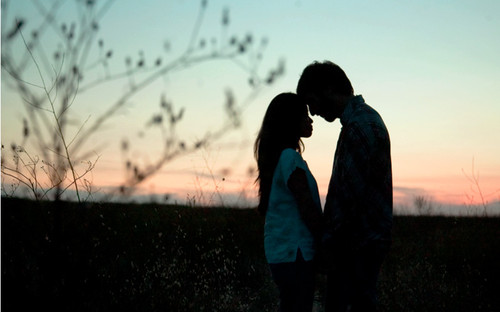We know kissing as a social pleasure, the appropriate end to a date and a means of connecting with our main squeeze. The collision of the lips and tongue that we often take for granted has a whole lot more bubbling under the surface than what meets the eye.
“Kissing is a mechanism for mate choice and mate assessment,” Helen Fisher, a Biological Anthropologist from Rutgers University here at the American Association for the Advancement of Science, said to a press conference crowded with science journalists hoping for a story or, perhaps, some advice.
Fun fact: Humans are the only animals with lips that purse outward. You could take that as proof that we’re made to kiss — some apes do too, but not the kind of make-out sessions us Homosapiens dig.
There’s nothing like a romantic kiss. It is the climax of every great love story and an experience that has motivated poets and musicians for thousands of years. It’s also a wonderful example of a behavior that is both nature and nurture. Humans have an instinctive drive to connect through kissing, but the style and expression is shaped by our culture and personal experiences. Pecking, smooching, French-kissing, and playing tonsil-hockey — there are as many names for kissing as there are ways to do it. Whether we use it as an informal greeting or an intensely romantic gesture, kissing is one of those ingrained human behaviors that seems to defy explanation.
Research suggests a little smooching helps your brain gather all sorts of important information about the guy (or gal) with whom you’ve locked lips. More than 90 percent of human society engages in – if you get right down to it- what seems like a very strange thing to do: putting faces together and trading spit. But because it is so pervasive, scientists think there must be a good reason for it, some kind of evolutionary advantage.
A Kiss Isn’t Just a Kiss
The most likely theory is that it stems from primate mothers passing along chewed food to their toothless babies. The lip-to-lip contact may have been passed on through evolution, not only as a necessary means of survival, but also as a general way to promote social bonding and as an expression of love. But something’s obviously happened to kissing since the time of the chewed-food pass. Now, it’s believed that kissing helps transfer critical information, rather than just meat bits. The kissing we associate with romantic courtship may help us to choose a good mate, send chemical signals, and foster long-term relationships. All of this is important in evolution’s ultimate goal—successful procreation. Kissing allows us to get close enough to a mate to assess essential characteristics about them, none of which we’re consciously processing. Part of this information exchange is most likely facilitated by pheromones, chemical signals that are passed between animals to help send messages.
What Happens to Your Body When You’re Kissing
A recent study reported in the journal Medical Hypotheses says kissing may increase a woman’s immunity from Cytomegalovirus. Cytomegalovirus, contracted through mouth-to-mouth contact, can cause infant blindness and other birth defects if the mother is a carrier during pregnancy. Otherwise, the bug is relatively harmless in adults. Lots of hormones are present in differing quantities in our saliva, and they may serve several romantic purposes. Your lips comprise one of your body’s densest zones of nerve endings, allowing you to detect even the faintest wisp of sensation, explains Sheril Kirshenbaum, author of The Science of Kissing. “The more anticipation you feel leading up to a kiss, the greater the dopamine spike,” she says, referring to the pleasure hormone your brain produces when you experience something enjoyable. Dopamine energizes your brain and senses, and prepares them to fully absorb new experiences and sensory information, Kirshenbaum says. And thanks to all those nerve endings, kissing fires up a surprisingly large portion of your brain, she says.
Other researchers note that kissing is biology’s way of determining whom in nature you are most genetically compatible with. “At the moment of the kiss, there are hard-wired mechanisms that assess health, reproductive status and genetic compatibility,” says Gordon G. Gallup Jr., a professor of evolutionary psychology at the State University of New York at Albany who studies reproductive competition and the biology of interpersonal attraction.
“There’s evidence that saliva has testosterone in it, and there’s also evidence that men like sloppier kisses with more open mouth,” Fisher said. “That suggests to me that they are unconsciously trying to transfer testosterone to trigger the sex drive in women.”
Strange but, it all starts with a tilt to the right. Eighty percent of people angle their head that way when going in for a kiss. Lips are up to 200 times more sensitive than supersensitive fingertips. Meanwhile, your nose is buried in his scent, which may be emitting subtle chemical attractants that could intensify your arousal. A quick peck uses a couple of muscles, but kissing passionately engages some 24 facial muscles — a fierce make-out might slay up to 100 calories. Crazy, right!
Further, sensing the hubbub, the adrenal glands unleash adrenaline. Cue a pounding heart, heavy breathing, or sweaty palms. The physical thrill may prompt your brain to cue up dopamine, a neurotransmitter associated with pleasure. At the same time, other parts of your brain are shutting down negative emotions. Any kind of make-out can reduce tension and hike happiness. A couple who kiss frequently are more likely to have long, satisfying relationships.
So what’s all the making out about? It may have to do with that elusive but essential ingredient to true love that we call chemistry.

